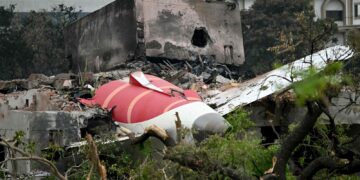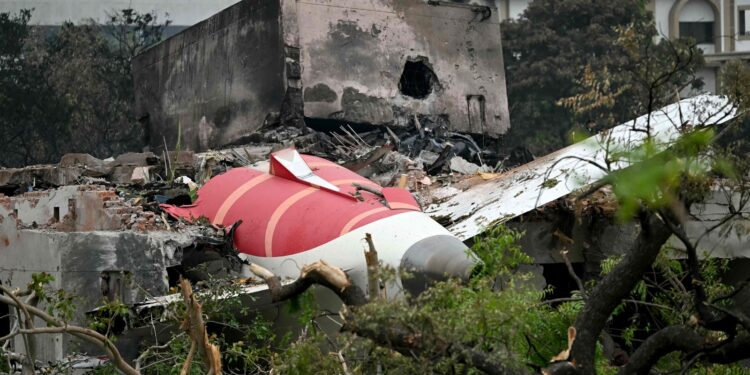These lapses, voluntarily disclosed by Air India, revealed that flight crew were scheduled and operated despite not meeting mandatory licensing, and rest norms
The aviation regulator, the Directorate General of Civil Aviation (DGCA), has ordered immediate action against three senior officials of Air India following “serious and repeated violations” related to flight crew scheduling.
These lapses, voluntarily disclosed by the airline, revealed that flight crew were scheduled and operated despite not meeting mandatory licensing, rest, and recency norms. The violations were uncovered during a post-transition review from the ARMS (Aviation Resource Management System—an integrated system airlines use for crew management) to the CAE Flight and Crew Management System.

“The voluntary disclosures, while noted, point to systemic failures in crew scheduling, compliance monitoring, and internal accountability. Of particular concern is the absence of strict disciplinary measures against key officials directly responsible for these operational lapses,” the order dated June 20 stated.
The regulator also stated that it has identified three officials as directly accountable: Choorah Singh, Divisional Vice President; Pinky Mittal, Chief Manager in the Directorate of Operations, Crew Scheduling; and Payal Arora, Crew Scheduling – Planning.
The order comes days after an Air India flight from Ahmedabad to Gatwick, London, crashed moments after takeoff, killing 241 people on board.

These officials have been held responsible for serious and repeated lapses, including unauthorized and non-compliant crew pairings, violations of mandatory licensing and recency norms, and systemic failures in scheduling protocols and oversight.
The DGCA directed Air India to remove the three officials from all roles and responsibilities related to crew scheduling and rostering.
“Internal disciplinary proceedings must be initiated against these officials without delay, and the outcome of such proceedings shall be reported to this office within 10 days from the date of issue of this letter,” the order stated.
The DGCA said the officials will be reassigned to non-operational roles pending the conclusion of corrective reforms in scheduling practices and will not hold any position involving direct influence over flight safety and crew compliance until further notice.
“Any future violation of crew scheduling norms, licensing, or flight time limitations detected in any post-audit or inspection will attract strict enforcement action, including but not limited to penalties, license suspension, or withdrawal of operator permissions, as applicable,” the order concluded.

India’s flagship carrier, Air India, is facing a storm of controversy after aviation authorities reportedly instructed the airline to terminate three employees over multiple safety violations.
This directive follows a string of disturbing incidents involving procedural lapses, mechanical irregularities, and alleged non-compliance with critical safety protocols. As India’s aviation sector expands rapidly, the incident has sparked concern among passengers and industry observers about the state of safety standards at one of the country’s most storied airlines.
This article unpacks the sequence of events that led to this drastic action, explores what it reveals about Air India’s internal operations, and examines broader implications for the airline industry in India.
Over the past several months, Air India has witnessed an unusual spike in safety-related concerns. Sources within the Directorate General of Civil Aviation (DGCA)—India’s aviation regulatory body—confirmed that multiple lapses were documented between April and June 2025. These ranged from emergency exits malfunctioning to crew miscommunication and even incorrect technical documentation on flights. Though none of these incidents resulted in fatalities or injuries, they have deeply eroded public confidence.
One of the more notable incidents involved a Delhi-Mumbai flight in early June, where the emergency slide reportedly deployed by mistake during ground operations—raising alarm about inadequate maintenance and crew training. On another occasion, a pilot was reported to have violated cockpit protocols, compromising the aircraft’s standard operating procedures.
The DGCA has now stepped in with a strong warning. According to reports, the agency held a high-level meeting with Air India officials where it expressed dissatisfaction over the airline’s compliance record. The outcome of that meeting was the directive to terminate three employees directly linked to recent safety lapses. While the names and designations of the individuals have not been publicly disclosed, sources suggest they were in supervisory and technical roles.
An internal audit conducted by Air India reportedly aligned with the DGCA’s findings, confirming that standard safety procedures were either not followed or outright ignored in several recent operations. In response, the airline has begun a top-to-bottom review of its safety protocols and staff training mechanisms.
In a formal statement released to the media, Air India acknowledged receiving the directive and committed to a “zero-tolerance approach to safety violations.” The airline emphasized that it is actively cooperating with the DGCA and has already taken steps to improve oversight mechanisms.
“We view these lapses with utmost seriousness,” the statement read. “Disciplinary proceedings have been initiated, and we are enhancing our internal audit and training procedures to align with global best practices.”
Air India has also established a Safety Compliance Review Committee to conduct monthly audits and submit real-time reports directly to the airline’s CEO and safety directorate.
The public reaction has been swift and largely critical. On social media, frequent flyers and aviation bloggers have voiced serious concerns about the carrier’s reliability. While many welcomed the DGCA’s intervention, others criticized the government and Air India management for not acting sooner.
“This is the national carrier. If even Air India can’t guarantee basic safety, where does that leave the rest of India’s aviation sector?” asked one passenger, who had recently flown on the airline and posted a thread detailing a poor in-flight experience.
Consumer trust, which had been slowly rebuilding after the airline’s acquisition by the Tata Group in 2022, is now once again under pressure. Analysts say that unless Air India addresses these concerns swiftly and transparently, it risks losing valuable market share to competitors like IndiGo, Vistara, and international carriers.
Aviation safety experts have weighed in on the issue, suggesting that the Air India situation is symptomatic of deeper problems within India’s fast-growing aviation ecosystem. With increasing demand, fleet expansion, and staffing pressures, corners are often cut in the rush to keep up with competition.
“Air India is just the tip of the iceberg,” said Capt. Arvind Mehta, a retired airline pilot and now a safety consultant. “There’s a culture of compliance on paper but not in practice. We need stronger internal whistleblower mechanisms and routine surprise checks.”
The International Civil Aviation Organization (ICAO) had recently praised India’s regulatory standards in a 2024 audit, but critics argue that real-world enforcement still lags behind.
Air India’s recent troubles present a significant reputational challenge for the Tata Group, which has been working diligently to revive the airline’s legacy. Since taking over, the Tatas have invested heavily in new aircraft, improved services, and digital upgrades. However, safety lapses pose a more existential threat—one that could undermine years of goodwill-building and strategic investments.
With plans underway to merge Air India with Vistara and expand its global footprint, the group cannot afford to let safety concerns derail its broader vision.
“This is a pivotal moment for the Tata Group’s aviation dream,” said an industry analyst. “If they fix the safety culture now, they can still emerge as a global player. If not, it could tarnish their entire aviation portfolio.”
The DGCA has also announced plans to conduct special audits of all major Indian carriers, not just Air India. These checks will include surprise inspections, simulator checks for pilots, and detailed reviews of maintenance records.
A spokesperson for the Ministry of Civil Aviation reiterated that “passenger safety is non-negotiable,” and that stricter enforcement actions—including license suspensions and financial penalties—will follow if compliance is not improved across the board.















 Categories
Categories









